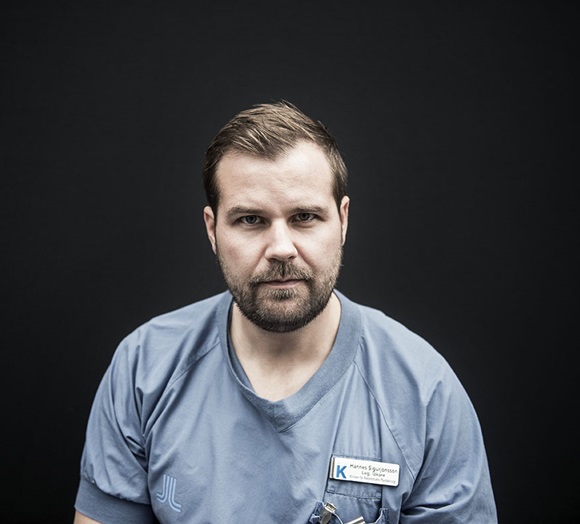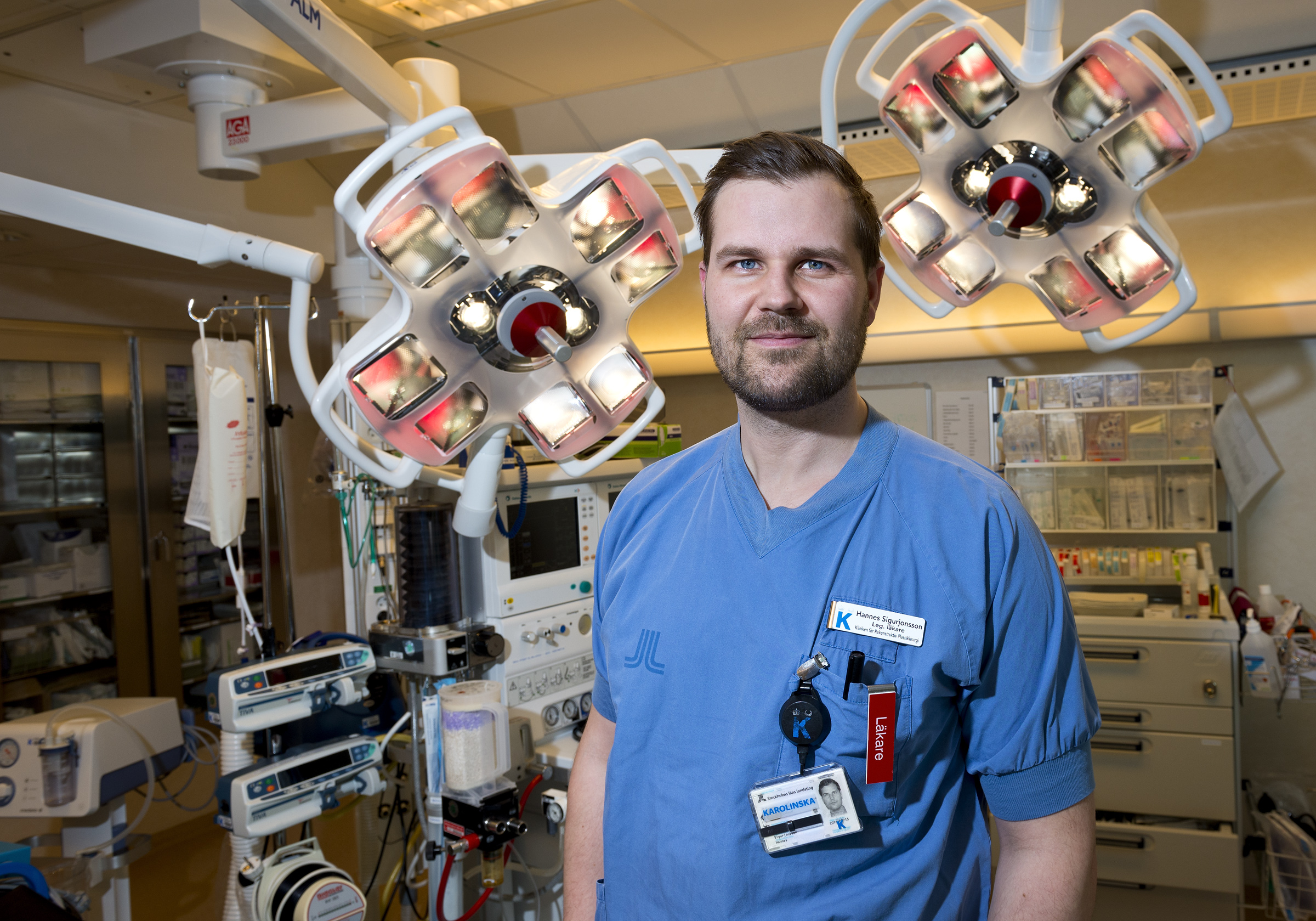Iceland has gained its first plastic surgeon specialized in gender reassignment surgery. Hannes Sigurjónson has taken over from Gunnar Kratz, a Swedish professor in plastic surgery, who has been performing these operations here since 2010. The new doctor says he’s very excited about the task and that he wants to offer trans-people in Iceland a broader spectrum of operative alternatives.
”We’ll be offering trans-men what’s called phalloplasty or penis construction for the very first time in Iceland. And also a new option for trans-women, who’ve had complications after their first surgery,“ says Hannes, when we inquire if there will be any novelties in gender reassignment surgery in Iceland now that he has taken over.
”Apart from that, I will be performing conventional “male-to-female” surgeries along with Halla Fróðadóttir, plastic surgeon at Landspítali hospital, in Iceland this fall. As well as doing smaller surgeries to help trans-women, who have had “male-to-female” surgery before, but for some reason have to come back for a touch up or corrective surgery.“
For the past five years Hannes has been training at Karolinska University hospital in Stockholm, Sweden (where he lives with his family) and is now a specialist in reconstructive plastic surgery. On top of that Hannes is finishing a Ph.D. in gender reassignment surgery and general health of trans-people, as well as being in charge of the gender reconstructive team, along with a colleague, at Karolinska University hospital. He will still be based in Sweden but intends to come over as often as he can, “to provide trans-people in Iceland the service that is rightfully theirs”, as he says in his own words.

Asked why he decided to specialize in this part of reconstructive plastic surgery, he says it’s because of all the development taking place every day. Many studies are currently being done on the surgery-techniques, which means that patients have more options to choose from. And that’s what makes the field so interesting.
”For example, we have just started performing quite an interesting surgery called “facial feminization” at Karolinska in Stockholm, with the aim of helping trans-women with dominant male facial features look more feminine. That along with the reasons previously mentioned is what makes this field of surgery extremely exciting for me. I just realized that if I specialized in gender reassignment surgery, then there would be so many possibilities for me as a surgeon.“
Furthermore, Hannes says that his patients are generally “just so much fun”. ”Most often they’re young, chipper and healthy. And they have high demands, which I find very positive since it makes you more ambitious to succeed. They’re also very well-informed; they talk to each other and know exactly what their surgery is about.
Also, they’re very thankful and they feel so much better after surgery and are therefore, as extensive reasearch also shows, much less likely to feel depressed and suicidal. So basically you can see that you are changing a person’s life to the better. Of course it’s very rewarding to witness that. And that’s what keeps you going in such a demanding job.“
”I think that breast-augmentation should be […] part of the package […] it should be paid by health insurance.“
One thing of the things that make the work so demanding are the surgery-techniques, which Hannes says are very complicated. ”The training is a difficult learning process you have to go through. You have to do many, many surgeries in order to become good. To gain the necessary skills takes a long time.“
But he points out that the resources in Sweden, especially at a large university hospital like the Karolinska, offer you the opportunity to do complicated and large procedures and to develop the technique till it becomes better.
”One example is that in the last 5-10 years we have been able to reduce surgery-time for male-to-female gender reassignment surgery from 4-5 hours to 1 1/2 -2 hours. This is because the surgery team, that is the surgeon, assistants, nurses, anesthetioligists etc., have had so much training that they’ve become like a well-oiled machine. And that results not only in reduced surgery-time but also in fewer complications for our patients.“
So is there a big difference between these kind of operations and general surgery?

”Oh yeah, a huge difference. You see, while general surgery mainly revolves around the intra abdominal area (i. kviðarhol) or breast cancer surgery (i. brjósta-krabbameinsskurðlækningar), the main purpose of plastic surgery is to improve functional abilities and the bodies’ appearance after an accident, cancer surgery, congenital defects and conditions like trans-sexualism. Which means that as a plastic surgeon you’re working all over the body, from head to toe so to speak, with patients of all ages.“
On that note, is there anything more you can tell us about the new procedures you’ll be offering?
”Well, regarding the phalloplasty procedures in general, there’s not enough tissue in the genital area to create a real size penis for trans-men. But now we’re able to create the penis from tissue that has been removed from the thigh or forearm. In short, that’s the procedure that we’ll now be offering trans-men in Iceland.
Now with trans-women, sometimes they have complications after their first surgery, for example if there wasn’t enough skin to create a vagina to begin with, there have been infections, bleeding etc. In recent years, we have been developing new procedures at the Karolinska University hospital, where we can now create a vagina from the small intestines. Procedures that have proven to be very successful. And now, those procedures will hopefully be available to the trans-women here.“
”[…] you can see that you are changing a person’s life to the better. […] And that’s what keeps you going in such a demanding job.“
You also mentioned that you will be offering smaller surgeries to help trans-women who – for some reason – have come for corrective surgery or touch up. What could the reasons for that be?
”Well, for example if the urethral opening is too small, or there is too much skin covering the vaginal-orifice (the opening).“
Are there any surgery-techniques you would like to implement here in Iceland?
”Yes phalloplasty should be available here. A surgery that trans-men have had to undergo in central Europe.
Also, I think that breast-augmentation should be offered to trans-women as part of the package. You see, research indicates that trans-women who don’t develop enough breast-growth through hormones, feel bad about it, have a harder time adjusting to their new gender roles and a tougher time being accepted as women by society. In those kind of situations I believe breast-augmentation could really help resolve the issues. Therefor, it should be paid by health insurance, the same way health insurance pays for “mastectomy” [removal of breasts] for trans-men.
These are the kind of surgeries I’d like to implement here. The kind of surgeries that are already considered standard in the other Nordic countries. I would like to see them become available for trans-people in Iceland.“


